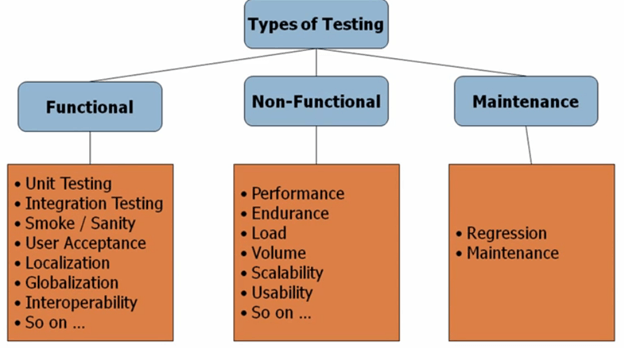
What is Non Functional Testing? Types with Example
What is Non-Functional Testing?
NON-FUNCTIONAL TESTING is defined as a type of Software testing to check non-functional aspects (performance, usability, reliability, etc) of a software application. It is designed to test the readiness of a system as per nonfunctional parameters which are never addressed by functional testing.
An excellent example of non-functional test would be to check how many people can simultaneously login into a software.
Non-functional testing is equally important as functional testing and affects client satisfaction.
In this tutorial, we will learn
- Objectives of Non-functional testing
- Characteristics of Non-functional testing
- Non-functional testing Parameters
- Type of Software Testing
- Non-functional Testing Types
- Example Test Cases Non-Functional Testing
Objectives of Non-functional testing
- Non-functional testing should increase usability, efficiency, maintainability, and portability of the product.
- Helps to reduce production risk and cost associated with non-functional aspects of the product.
- Optimize the way product is installed, setup, executes, managed and monitored.
- Collect and produce measurements, and metrics for internal research and development.
- Improve and enhance knowledge of the product behavior and technologies in use.
Characteristics of Non-functional testing
- Non-functional testing should be measurable, so there is no place for subjective characterization like good, better, best, etc.
- Exact numbers are unlikely to be known at the start of the requirement process
- Important to prioritize the requirements
- Ensure that quality attributes are identified correctly in Software Engineering.
Non-functional testing Parameters

1) Security:
The parameter defines how a system is safeguarded against deliberate and sudden attacks from internal and external sources. This is tested via Security Testing.
2) Reliability:
The extent to which any software system continuously performs the specified functions without failure. This is tested by Reliability Testing
3) Survivability:
The parameter checks that the software system continues to function and recovers itself in case of system failure. This is checked by Recovery Testing
4) Availability:
The parameter determines the degree to which user can depend on the system during its operation. This is checked by Stability Testing.
5) Usability:
The ease with which the user can learn, operate, prepare inputs and outputs through interaction with a system. This is checked by Usability Testing
6) Scalability:
The term refers to the degree in which any software application can expand its processing capacity to meet an increase in demand. This is tested by Scalability Testing
7) Interoperability:
This non-functional parameter checks a software system interfaces with other software systems. This is checked by Interoperability Testing
8) Efficiency:
The extent to which any software system can handles capacity, quantity and response time.
9) Flexibility:
The term refers to the ease with which the application can work in different hardware and software configurations. Like minimum RAM, CPU requirements.
10) Portability:
The flexibility of software to transfer from its current hardware or software environment.
11) Reusability:
It refers to a portion of the software system that can be converted for use in another application.
Type of Software Testing
In general, there are three testing types
- Functional
- Non – Functional
- Maintenance

Under these types of testing, you have multiple TESTING Level’s, but usually, people call them as Testing Types. You may find some difference in the above classification in different books and reference materials.
The above list is not the complete as there are more than 100 Types of Testing and counting. No need to worry, you will pick them up as you age in the testing industry. Also, note that not all testing types apply to all projects but depend on the nature & scope of the project. More on this in a later tutorial.
Non Functional Testing Types
Following are the most common Types of Non Functional Testing :
- Performance Testing
- Load Testing
- Failover Testing
- Compatibility Testing
- Usability Testing
- Stress Testing
- Maintainability Testing
- Scalability Testing
- Volume Testing
- Security Testing
- Disaster Recovery Testing
- Compliance Testing
- Portability Testing
- Efficiency Testing
- Reliability Testing
- Baseline Testing
- Endurance Testing
- Documentation Testing
- Recovery Testing
- Internationalization Testing
- Localization Testing
Example Test Cases Non-Functional Testing
Following are examples of Non-Functional Testing
| Test Case # | Test Case | Domain |
|---|---|---|
| 1 | Application load time should not be more than 5 secs up to 1000 users accessing it simultaneously | Performance Testing |
| 2 | Software should be installable on all versions of Windows and Mac | Compatibility Testing |
| 3 | All web images should have alt tags | Accessibility testing. |




0 Response to "What is Non Functional Testing? Types with Example"
Post a Comment